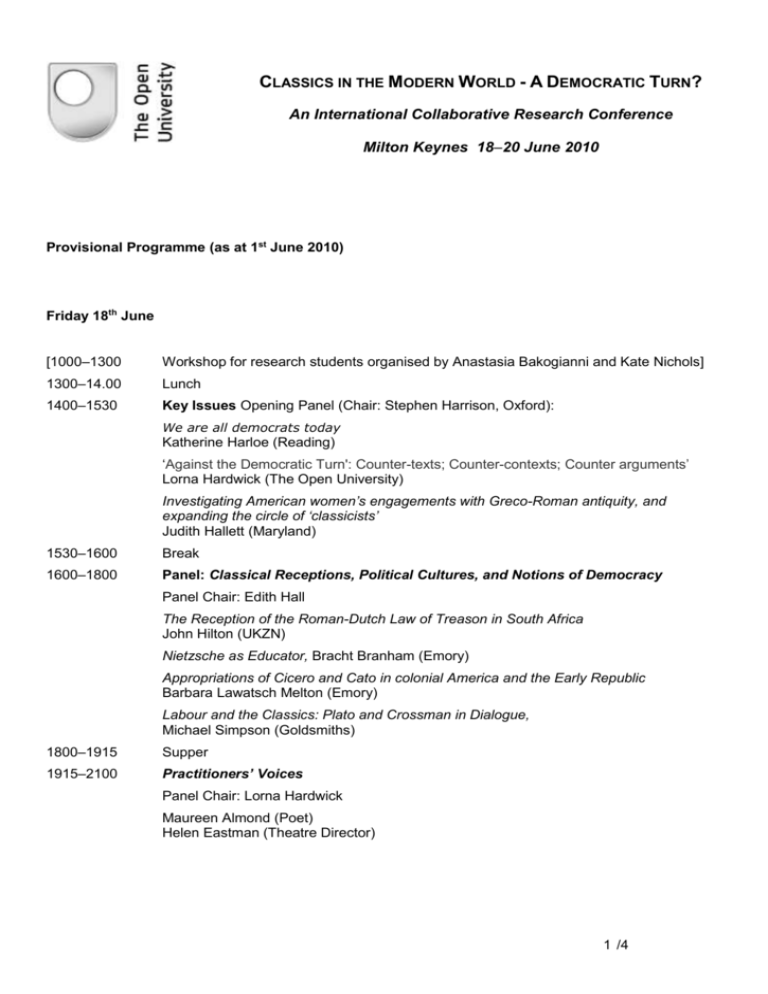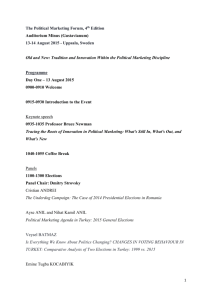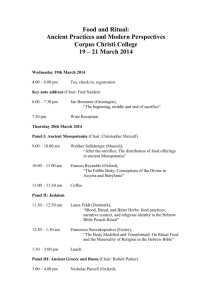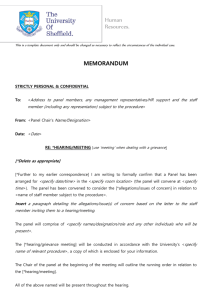word doc - The Open University
advertisement

CLASSICS IN THE MODERN WORLD - A DEMOCRATIC TURN? An International Collaborative Research Conference Milton Keynes 18–20 June 2010 Provisional Programme (as at 1st June 2010) Friday 18th June [1000–1300 Workshop for research students organised by Anastasia Bakogianni and Kate Nichols] 1300–14.00 Lunch 1400–1530 Key Issues Opening Panel (Chair: Stephen Harrison, Oxford): We are all democrats today Katherine Harloe (Reading) ‘Against the Democratic Turn': Counter-texts; Counter-contexts; Counter arguments’ Lorna Hardwick (The Open University) Investigating American women’s engagements with Greco-Roman antiquity, and expanding the circle of ‘classicists’ Judith Hallett (Maryland) 1530–1600 Break 1600–1800 Panel: Classical Receptions, Political Cultures, and Notions of Democracy Panel Chair: Edith Hall The Reception of the Roman-Dutch Law of Treason in South Africa John Hilton (UKZN) Nietzsche as Educator, Bracht Branham (Emory) Appropriations of Cicero and Cato in colonial America and the Early Republic Barbara Lawatsch Melton (Emory) Labour and the Classics: Plato and Crossman in Dialogue, Michael Simpson (Goldsmiths) 1800–1915 Supper 1915–2100 Practitioners’ Voices Panel Chair: Lorna Hardwick Maureen Almond (Poet) Helen Eastman (Theatre Director) 1 /4 Saturday 19th June 0900–1100 Session Chair: Nurith Yaari (Tel Aviv) Key Issue: Can ‘Democratic’ Stagings of Modern Greek Drama be Authentic? Mary-Kay Gamel (UCSD) Panel: Demotic Power to the People: the spread of demotike in Modern Greek Productions of Ancient Greek Drama: The use of language in the reception of ancient Greek drama in Modern Greece from the liberation of the nation to the first quarter of the 20th century, Hara Thliveri, Paedagogical Institute, Ministry of Education, Athens The triumph of demotike: the triumph of Medea Anastasia Bakogianni (The Open University) 1100–1130 A case study Panel Chair: Laura Monros Gaspar, Alicante ‘Aristophanes in Performance as an all-inclusive event’: audience participation and celebration in the modern staging of Aristophanic comedy. Angeliki Varakis (University of Kent) 1130–1300 Panel: Contemporary Performance and Ancient Greek Texts Panel Chair: Freddy Decreus (Gent) Aristophanes and the Skills of the Comic Actor Graham Ley (Exeter) The Silence of Eurydice: towards a new aesthetic for creating theatre in a conflict zone Dorinda Hulton (Exeter) Re-animating Antiquity: Gardzienice Theatre's process into contemporary performance Yana Sistovari (also known as Yana Zarifi ) (Artistic Director of Thiasos Theatre Company. Thiasos ) 1300–1400 Lunch 1400–1600 Session Chair: Paula James (The Open University) 1400–1430 A Case Study: Classical Studies and People of African Descent Michele Valerie Ronnick (Wayne State University) 1430–1600 Panel: African Americans and the Classics The Weapon of Oratory Margaret Malamud (New Mexico) African-American Rhetoric, Christian Political Theology, and Classical Culture, Steven Mailloux (Loyola Marymount) The Classical Curricula at Black Colleges and Universities: Subtext for Self- and Group-Affirmation Kenneth W. Goings and Eugene O’Connor (Ohio State) 1600–1615 Refreshments 1615–17.45 Panel: Democracy and popular media Panel Chair: Sara Monoson (Northwestern) Democracy and popular media: classical receptions in 19th and 20th centuries political cartoons: statesmen, mythological figures and celebrated artworks, Alexandre G. Mitchell (Oxford) In search of ancient myth: documentaries and the quest for the Homeric world, Antony Makrinos (UCL) 2 /4 Truth, Justice, and the Spartan Way: Affectations of Democracy in Frank Miller’s 300 George A. Kovacs, Trent University (Canada) 17.45-18.30 International Round Table Review of the conference so far (1): Panel Chair: Lorna Hardwick Freddy Decreus (Gent) Epistemological questions Nurith Yaari (Tel Aviv) Questions of Practice 1830–2030 Conference Dinner Sunday 20th June 0900–1100 Parallel Panels: ***** Panel 1: Classical Reception in late 20th/early 21st century women’s writing: A Democratic Turn Panel Chair: Anastasia Bakogianni (The Open University) Colonising the ‘provinces of masculine knowledge’: women’s writing and classical reception today Fiona Cox (UCC) and Elena Theodorakopoulos (Birmingham) Ovidian Metamorphoses in the Fiction of A.S. Byatt Fiona Cox (UCC) Three Novels about Catullus and Lesbia, Elena Theodorakopoulos (Birmingham) ***** Panel 2: Education Chair: Kate Nichols (Bristol) Crossing Boundaries through Digital Humanities: HESTIA and US Schools, Elton Barker (OU) and Chris Ann Matteo (Stone Bridge High School, Virginia) Classics in African Education, Barbara Goff (Reading) The Democratic Turn in (and through) pedagogy: a case study of the Cambridge Latin Course Jo Paul (Liverpool) Back to the demos. An ‘anti-classical’ approach to Classics? Martina Treu (IULM, Milan) 1100–1130 Key Issue Chair: Katherine Harloe (Reading) Conflicts of democracy and citizenship: Between the Greek and the Roman Political Legacies, Aleka Lianeri (Thessaloniki) 1130–1300 APA Panel: Democracy as Popular and Political Panel Chair: Alastair Blanshard (Sydney) Projecting Lysistrata: Classical Drama and Political Activism Dorota Dutsch (UCSB) Expansion of Tragedy as Critique Nancy Sorkin Rabinowitz (Hamilton College) 3 /4 Venus orta mari and Other Fantastic Advice Kate Bosher and Jordana Cox (Northwestern) 1300–1400 Lunch 1400–1600 Panel: Public Experience and popular classics Panel Chair: Elton Barker (The Open University) Penguin(’s) Classics Robert Crowe (Bristol) Civilization versus Savagery at the 1893 World’s Columbian Exposition Robert Davis (CUNY) Pompeii in the Crystal Palace: Comparing Victorian and Modern Virtual Immersive Environments Shelley Hales (Bristol) Broadcasting the ‘Nation’s Cultural Wealth’: Ancient Greece on BBC Radio in the Two Post-World War Periods Amanda Wrigley (Northwestern) 1600–1730 Round Table Review Chair: Lorna Hardwick (The Open University) International Round Table Review (2) Ahmed Etman (Cairo), Classics in Egypt Alastair Blanshard (Sydney), Classical and Popular Cultures Discussion on future research questions and collaborations 1800 Close 4 /4
![For the full programme click here [Word]](http://s3.studylib.net/store/data/007111369_1-4e0187ff3f28659c587dbc936eb75aec-300x300.png)







